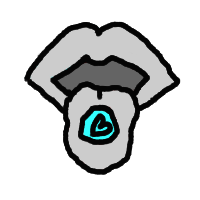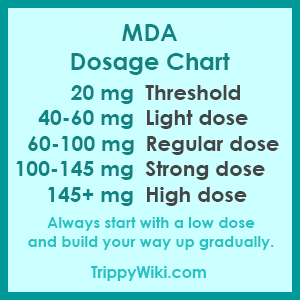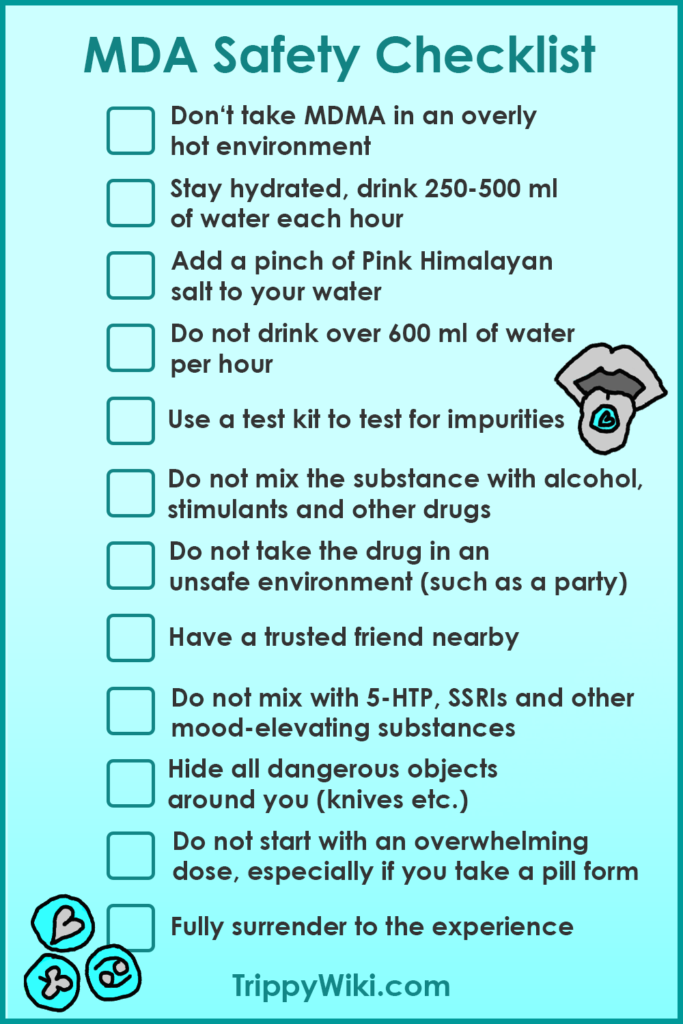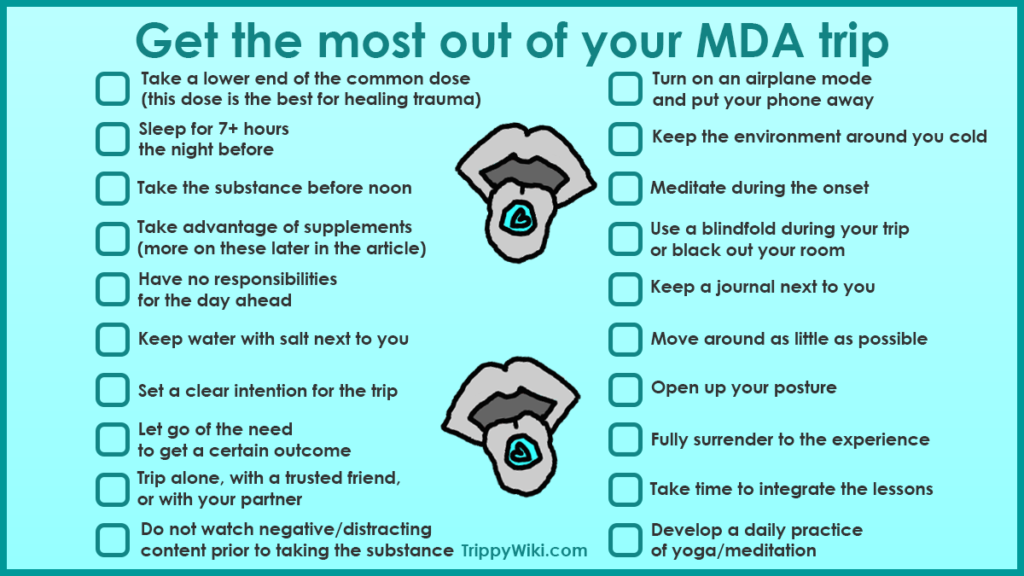MDA
(Tenamfetamine, Sally, Sass)
TrippyWiki score: 7.1/10
TABLE OF CONTENTS

What is MDA?
MDA is an entactogen of the amphetamine class. MDA’s effects are extremely similar to those of more popular MDMA. The main difference between the two is that MDA is more stimulating and psychedelic. The MDA trip also lasts for longer.
Why choose MDA over other psychedelics?
MDA…
Long-term benefits & side effects
Many of the benefits will only occur if you follow the tips below.
Most (if not all) of the side effects are preventable and they will not happen if you follow the Safety checklist.
MDA…
How to take MDA
Pills vs. Powder
MDA mainly comes in 2 forms: powder and pill form.
Taking a pill is not recommended for 2 reasons:
1) The pills are notoriously cut with other drugs that are cheaper to produce (methamphetamine is a common substitute).
2) The amount of MDA in a pill can vary greatly.
Whichever form you choose, always test your substance with a Marquis Reagent Testing Kit. Be especially careful if the test turns orange or red.
If you take a pill form, start smaller than you would because you cannot know how much MDA is in there.
Administration
The substance is either snorted or taken orally. You could also inject MDA or plug it but these methods are not recommended.
Snorting MDA will lead to a faster onset but has multiple risks associated with it. This is why the best way to consume the drug is to swallow it.

Dosage
The high end of a low dose seems to be the best dose to take if you are taking MDA for long-term benefits.
Unlike with LSD or magic mushrooms, there is no correlation between mystical experiences and therapeutic effects when it comes to MDA.
The benefits of a low-regular dose are as big as they can get while the negatives are multiple times smaller than if you were to take higher doses.
Strong doses are neurotoxic and will likely cause long-term damage to your neurotransmitter receptors. On top of that, high doses of MDA can be lethal.
With that said, people with autism or those who weigh a lot need a higher dose to achieve the same effects as other people.
The same can be said about people who have been taking entactogens in the past since it can take multiple months to become sensitive to the substance again.
Safety checklist

Maximize the benefits

Keep in mind that integration is even more important than the trip itself. Taking psychedelics would be almost useless if you didn’t retain any lessons in your day-to-day life.
What will help you the most is contemplating about the experience – be it by journaling, thinking about the trip, or sharing your memories with a trusted friend.
Distracting thoughts can get in the way, which is why you want to spend the day after your trip without TV, social media, and other distractions.
If you can, spend time in silence and solitude. Meditate, go for a walk, contemplate the experience.
Duration

Onset = 30-90 minutes
Come up = 15-30 minutes
Peak = 3-4 hours
Offset = 2-3 hours
What does MDA feel like?
MDA’s effects are extremely similar to those of MDMA. The main difference between the two is that MDA is more stimulating and psychedelic.
Even though MDA is more psychedelic than MDMA, the drug still isn’t nearly as psychedelic as LSD or mushrooms.
After you take the drug, your brain releases dopamine, serotonin, oxytocin, norepinephrine, and other “happy chemicals”. This is why the experience tends to be extremely pleasant.
On MDA, it is common to feel extreme euphoria, love, compassion, connection with everything and everyone, and every other positive feeling you can imagine. You will feel like everything is perfect.
MDA is reported to have slightly lower entactogen effects than MDMA but the difference is not dramatic.
People become way more social and talkative on MDA. Because of this, the drug is a powerful tool for treating social anxiety and even autism.
The downside is that you may share some secrets with people around you that you will later regret. You may also end up in bed with a stranger who has an STD.
Users report that MDA is better than MDMA in high-intensity environments, such as parties and festivals.
For those who take MDA or other entactogens with the purpose of healing their trauma, the experience isn’t always pleasant. In fact, most therapy participants describe the experience as challenging.
MDA can make you anxious but this mainly happens during a come-up. After that, the anxiety usually dissolves.
Other common short-term effects include:
Higher self-esteem
Tingling sensation
Increased creativity and open-mindedness
Mindfulness, being present
Higher capability for love and compassion
Pain relief
Feeling one with all that is
Seeing life from a different perspective
Appreciating small things
Higher energy
Increased awareness
Stamina enhancement
Feeling your emotions more intensely
Memory suppression
Time distortion (time speeds up)
Visual effects (especially during the offset)
No appetite
Shaking
Jaw clenching
Headaches
Muscle tension
Fatigue
Inability to focus
Nausea, vomiting
Increased body temperature
Increased heart rate
Worse thermoregulation
Difficulty urinating
Anxiety, paranoia
Vulnerability
Insomnia
The higher the dose you take, the more intense these effects will be.
After the trip, some users find it difficult to fall asleep.
MDA will almost always give you a pleasant experience. Bad trips can happen but you can prevent them by following the tips below.
After the trip, there is a chance that you will experience an afterglow or a crash, also called a comedown.
MDA Comedown
After the trip, your brain will be depleted of serotonin, dopamine, and norepinephrine. When this happens, you may have to suffer through a period of not having enough of these happy chemicals.
During the crash, people often feel extremely depressed and have no motivation to do anything. Many MDA users report having suicidal thoughts.
This period usually lasts a few days but can sometimes take weeks or even months.
How to prevent a comedown
In a psychotherapeutic setting, MDA crashes would only happen to 1/3 of participants and would be very mild. If you don’t follow these rules, the chance will be much higher and the crash will be longer and a lot more unpleasant.
How to cope with a comedown
Bad trips
Bad trips mostly happen because people take the substance irresponsibly. If you take this psychedelic the right way, there is virtually no chance you’ll get a bad trip.
In case you still do, that’s good! A “bad” trip isn’t bad, it can actually be the most healing and insightful moment of your life!
During a “bad” trip, negative emotions are coming up from your subconscious mind. They have always been there whether you are aware of it or not. They have been damaging your life and a difficult trip is an opportunity to process these traumas and unpleasant feelings and let go of them.
The more painful the experience, the more you can heal.
So instead of calling bad trips bad, call them challenging.
If you understand that bad trips are awesome in the long run, not only will you feel more comfortable diving into these challenging states, it will actually excite you!
Why they happen
The most common reasons for getting a bad trip are:
How to cope with a bad trip
Interactions
Legality
As of 2021, MDA is illegal in the vast majority of countries.
In some countries, you can legally own a small amount of the substance for personal use.
FAQ
“When the power of love overcomes the love of power, the world will know peace.“
– Jimi Hendrix
You may also like:
Thank you for taking psychedelics responsibly, immature psychonauts are the last thing the psychedelic movement needs.
And thank you for being a part of this renaissance. Together, we can change the world!
